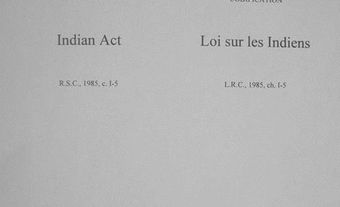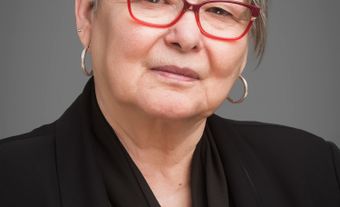The McIvor v. Canada case was about gender discrimination in section 6 of the 1985 Indian Act, which deals with Indian status. Sharon McIvor — a woman who regained status rights after the passing of Bill C-31 in 1985 — was not able to pass on those rights to her descendants in the same way that a man with status could. In her case against the federal government, the British Columbia Supreme Court ruled in 2007 that section 6 did, in fact, deny McIvor’s equality rights under the Canadian Charter of Rights and Freedoms. In response to this case, the federal government introduced new legislation (Bill C-3) in 2011 to counter gender discrimination in the Indian Act.

Sharon McIvor talking at the microphone during a hearing about missing and murdered Indigenous women in British Columbia, held by the Inter-American Commission on Human Rights.
Context
In 1985, Sharon McIvor applied to register herself as a Status Indian, following amendments to the Indian Act that year. Known as Bill C-31, these amendments restored and provided status to many women who had lost their rights after marrying non-status men.
Under the new terms of the Act, McIvor had status under section 6(1)(c), while her son had status under section 6(2). The main difference between sections 6(1)(c) and (2) is that the first group can pass on status to their children, while the second cannot.
McIvor argued that this was discriminatory. If she were a man with status, her children would have rights under section 6(1)(a), and her grandchildren would also have status either under section 6(2) if born after 1985, or under section 6(1)(c) if born before 1985. But because McIvor is a woman, her children’s status rights are not equal to those of a man with status, and her grandchildren would not receive status under the Act.
McIvor took the federal government to court, arguing that section 6 of the Indian Act was discriminatory and infringed on her Charter rights.
Trial Case
It took 17 years before Sharon McIvor’s case was heard in 2006 before the British Columbia Supreme Court. With her son Charles Jacob Grismer as a co-plaintiff, McIvor argued that the denial of Status had social, financial and cultural consequences for her family. They were excluded from traditional hunting, gathering and fishing practices, as well as their community’s marriage, funeral and healing ceremonies. In addition to being barred from living or going to schools on-reserve, the McIvor family also did not qualify for the same post-secondary, health and dental benefits that Status Indians receive.
Trial judge Carol Ross ruled in June 2007 that section 6 of the 1985 Indian Act was discriminatory and infringed on Charter rights. The court ruled that section 6 would have “no force and effect insofar…as it authorizes the differential treatment of Indian men and Indian women born prior to April 17, 1985...”
Appeals Case
The federal government challenged Ross’s ruling in the British Columbia Court of Appeal in October 2008. The appeal court found discrimination in the Indian Act, but on a narrower basis than the trial court. The appeal court was only concerned with sections 6(1)(a) and 6(1)(c) of the Act, as they violated the Charter by giving some individuals more rights than others. The appeal court ruled that the federal government, not the courts, must remedy the discrimination in the Indian Act. It gave the federal government one year, until 6 April 2010, to make the necessary amendments.
In June 2009, Chuck Strahl, Minister of Indian Affairs and Northern Development, announced that the federal government would not appeal the decision and it went ahead with planning legislative amendments to section 6 of the Indian Act. In the same year, the Supreme Court of Canada denied McIvor’s application to challenge the appeal court’s decision.
Bill C-3
In 2011, Parliament passed Bill C-3, Gender Equity in Indian Registration Act. The bill allowed for changes to make section 6 of the Indian Act more inclusive and fairer. Under the new rules, McIvor’s son now had section 6(1)(c) status and could therefore pass on status rights to his children born under section 6(2).
However, Bill C-3 did not completely rid the Act of discrimination. The descendants of women, specifically in terms of great-grandchildren, did not have the same entitlements as descendants of men in similar circumstances. Therefore, some individuals were still denied status rights because of gender discrimination.
UN Human Rights Committee
Sharon McIvor and her son Charles Jacob Grismer petitioned the United Nations Human Rights Committee (UNHRC) in November 2010, arguing that the Indian Act remained discriminatory. In May 2016, the federal government asked UNHRC to suspend consideration of Sharon McIvor’s petition. She objected to the request.
In January 2019, UNHRC found that the Indian Act discriminates against Indigenous women in Canada. Its suggestion to the Canadian government was to ensure that First Nations women receive Indian status in the same way that men do.
Significance
The McIvor case has influenced the ways that lawmakers understand status rights. It has also directly influenced other court cases, such as the 2015 Descheneaux case in Quebec, which was about sex-based inequities in the Indian Act, as they relate to cousins and siblings. In response to this case, in 2017, Parliament passed another amendment to the Indian Act, Bill S-3. Some parts of the bill took effect on 22 December 2017, while others took effect on 15 August 2019. According to the federal government, “All known sex-based inequities in the Indian Act have now been addressed.”

 Share on Facebook
Share on Facebook Share on X
Share on X Share by Email
Share by Email Share on Google Classroom
Share on Google Classroom




